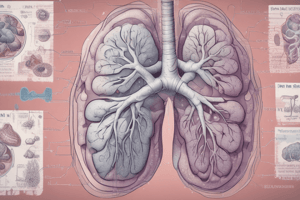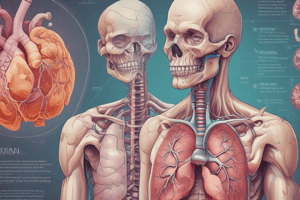Podcast
Questions and Answers
Which type of pneumonia is characterized by infection in a single lobe of the lung?
Which type of pneumonia is characterized by infection in a single lobe of the lung?
- Bronchopneumonia
- Lobar pneumonia (correct)
- Interstitial pneumonia
- Atypical pneumonia
What is the leading cause of death in infectious diseases associated with community-acquired pneumonia?
What is the leading cause of death in infectious diseases associated with community-acquired pneumonia?
- Bacterial infections (correct)
- Tuberculosis
- Polymicrobial infections
- Viral infections
Which of the following microorganisms is classified as atypical and can cause pneumonia?
Which of the following microorganisms is classified as atypical and can cause pneumonia?
- Haemophilus influenzae
- Streptococcus pneumoniae
- Klebsiella pneumoniae
- Chlamydophila pneumoniae (correct)
Hospital-acquired pneumonia is defined by the onset of symptoms occurring after how many hours of admission?
Hospital-acquired pneumonia is defined by the onset of symptoms occurring after how many hours of admission?
Which of these risk factors is NOT associated with community-acquired pneumonia?
Which of these risk factors is NOT associated with community-acquired pneumonia?
What type of pneumonia results from aspiration of food into the lungs?
What type of pneumonia results from aspiration of food into the lungs?
Which of the following is NOT considered a typical bacteria causing community-acquired pneumonia?
Which of the following is NOT considered a typical bacteria causing community-acquired pneumonia?
What is the primary symptom suggesting pneumonia in a patient with a cough?
What is the primary symptom suggesting pneumonia in a patient with a cough?
Which classification indicates the source of pneumonia based on where the infection was acquired?
Which classification indicates the source of pneumonia based on where the infection was acquired?
What percentage of community-acquired pneumonia cases are estimated to be polymicrobial?
What percentage of community-acquired pneumonia cases are estimated to be polymicrobial?
Flashcards are hidden until you start studying
Study Notes
Pneumonia
- An infection of one or both lungs that fills the air sacs, or alveoli, with fluid or pus.
- Causes infection of the pulmonary parenchyma.
Pneumonia Classifications
- Anatomy/Histology:
- Lobar: Affects a single lobe.
- Bronchopneumonia (Lobular): Patchy areas, multiple lobes and bronchioles.
- Interstitial (Atypical): Affects the interstitium.
- Etiology:
- Bacterial
- Viral
- Fungal
- Atypical
- Parasitic
- Aspiration
- Where infection was acquired:
- Community-acquired pneumonia (CAP): Signs/symptoms develop prior to or within 48 hours of admission.
- Hospital-acquired pneumonia (HAP): Signs/symptoms develop after 48 hours of admission.
- Ventilator-associated pneumonia (VAP): Signs/symptoms develop within 48 hours of intubation through 48 hours after extubation.
- Aspiration pneumonia: Infection from food that went to the lungs instead of the esophagus.
CAP
- Leading cause of death in infectious diseases.
- Only 38% of patients are reported back with the pathogens.
- Risk factors:
- Smoking
- Alcohol consumption
- Household size
- Comorbidities
- Age (cough and gag reflex)
CAP - Etiology
- 10-15% of CAP cases are polymicrobial.
- Typical bacteria:
- Streptococcus pneumoniae (S pneumoniae)
- Haemophilus influenzae (H influenzae)
- Staphylococcus aureus (S aureus)
- Klebsiella pneumoniae (K pneumonia)
- Pseudomonas aeruginosa (P aeruginese)
- Atypical microorganisms:
- Mycoplasma pneumoniae
- Chlamydophila pneumoniae
- Legionella species
- Respiratory viruses (influenza A and B, rhinovirus, human metapneumovirus, respiratory syncytial virus [RSV], parainfluenza, severe acute respiratory syndrome coronavirus-2 [SARS-CoV-2], and adenovirus).
- S.aureus pneumonia can complicate influenza virus infection.
Studying That Suits You
Use AI to generate personalized quizzes and flashcards to suit your learning preferences.




